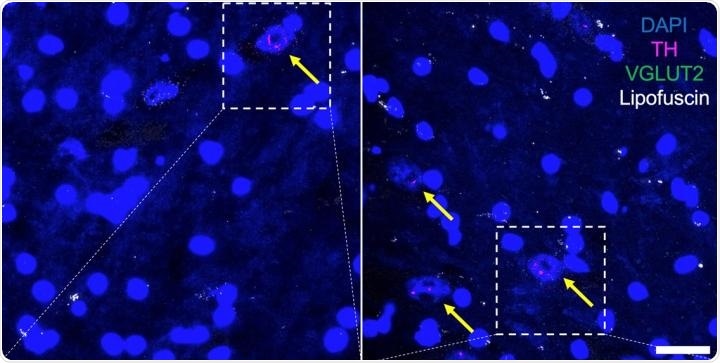The discovery of a mechanism so basic that it is seen in rodents, humans, and fruit flies is not something usual.

In human subjects, the relative density of VGLUT-carrying dopamine neurons (shown by the yellow arrows) is greater in females (right panel) than in males (left panel). Image Credit: Zachary Freyberg.
Neuroscientists from the University of Pittsburgh Schools of the Health Sciences found that a single protein—a glutamate transporter on the membrane of vesicles that contain dopamine in neurons—is critical to controlling sex disparities in the brain’s susceptibility to age-related neuron loss. The study findings have been reported in a paper published today in Aging Cell.
The protein, known as VGLUT, was shown to be more abundant in dopamine neurons of female rodents, humans, and fruit flies than in males, corresponding to females’ greater resistance to age-related mobile deficiencies and neuron loss.
Intriguingly, genetically lowering VGLUT levels in female flies reduced their defense against neurodegeneration linked with aging, implying that VGLUT may be a new target for prolonging dopamine neuron resilience and slowing down the initiation of aging-related brain symptoms.
From flies to rodents to human beings, we found that VGLUT levels distinguish males from females during healthy aging. The fact that this marker of dopamine neuron survival is conserved across the animal kingdom suggests that we are looking at a fundamental piece of biology. Understanding how this mechanism works can help prolong dopamine neuron resilience and delay aging.”
Zachary Freyberg, MD, PhD, Study Senior Author and Assistant Professor of Psychiatry and Cell Biology, University of Pittsburgh
Parkinson’s disease and other neurodegenerative diseases are more likely to occur as humans get older. Parkinson’s disease, described as a slow but relentless depletion of dopamine neurons in the brain that affects the ability to talk or move, is known to primarily affect men.
Although biological sex variations, caused by a mixture of genetic, environmental, and hormonal factors, elucidate why females are shielded from the early stages of Parkinson’s, the driver and regulator of these defenses remained unexplained so far.
Researchers discovered that age-related advantages offered to females vanished when the levels of VGLUT gene expression in dopamine neurons were dramatically decreased. They achieved this by employing a combination of genetic and biochemical methods, together with behavioral studies in which the locomotion of flies was tracked for a 24-hour duration.
We found that VGLUT expression increases with age, and that flies become more vulnerable to dopamine neuron degeneration when we knock down VGLUT. We also found that VGLUT expression is higher in females than males, suggesting that VGLUT may play a role in regulating sex differences in vulnerability to neurodegeneration in Parkinson’s and other neurological disorders where females are more resilient than males.”
Silas Buck, Study Lead Author and PhD Candidate, Pitt Center for Neuroscience
As the number of people diagnosed with Parkinson’s disease worldwide is increasing and expected to reach 20 million by 2040, Pitt researchers aim to further investigate the function of VGLUT in neuroprotection in humans.
We are entering an epidemic of Parkinson’s disease, and we need to understand how to make our neurons more resilient. VGLUT is a tantalizing new target that is key to not only understanding the fundamental biology at the core of dopamine neurons’ survival, but ultimately for developing new therapeutics.”
Zachary Freyberg, MD, PhD, Study Senior Author and Assistant Professor of Psychiatry and Cell Biology, University of Pittsburgh
Source:
Journal reference:
Buck, S. A., et al. (2021) Vesicular glutamate transporter modulates sex differences in dopamine neuron vulnerability to age‐related neurodegeneration. Aging Cell. doi.org/10.1111/acel.13365.